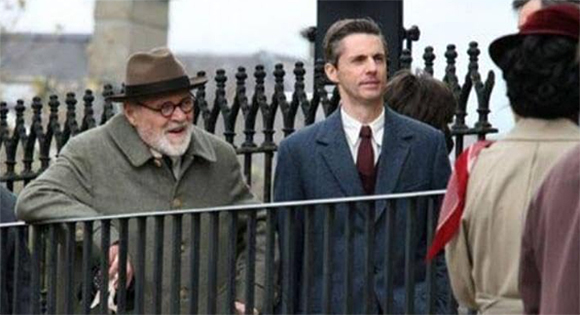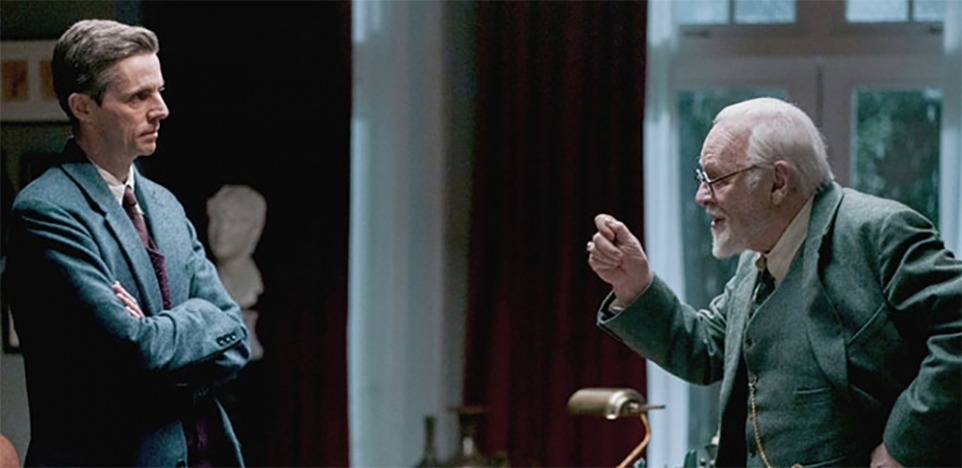A message from England’s Prime Minister on the radio announces that the country is at war with Germany. It is 1939 and the famous Austrian neurologist and founder of psychoanalysis, Sigmund Freud (Anthony Hopkins), is living in London with his daughter Anna (Liv Lisa Fries). He is dying of oral cancer and is in great pain. When she goes out to give a lecture and pick up more morphine for him, he keeps an appointment in his home with an Oxford don, C. S. Lewis (Matthew Goode). The two are curious about each other. Lewis has recently converted to Christianity, whereas Freud is a known opponent of religion and a disbeliever in God.
This is the set-up for Freud’s Last Session, directed by Matthew Brown from a play by Mark St. Germain. Most of the film takes place in Freud’s office, a place cluttered with statues of gods and goddesses, much to the amusement of Lewis. A side story focuses on Anna, her lesbian relationship with another teacher (Dorothy Burlingham), and her attachment to her father as his caregiver. Through flashbacks we learn of their leaving Austria and her therapy sessions with him.
Other flashbacks reveal how Lewis’s mother died when he was young and he was sent off to boarding school by his father. During World War I, he was wounded in battle and witnessed the death of his best friend. That experience has made him fearful of closed spaces that remind him of the trenches. When sirens in London warn of an air attack, he and Freud go outside to a bomb shelter and Freud has to help him through a panic attack.

These moments create some context around the main characters, but it’s their conversation that makes the film worth watching. Anthony Hopkins and Matthew Goode seem to inhabit these characters, conveying a range of emotions and intellectual honesty as the two men develop mutual respect and even some affection.
Here are some examples of their exchanges:
Being Led to God
Lewis tells the story of receiving a special birthday gift from his brother when he was at boarding school. It was a toy forest he created in a biscuit box with a deer figurine, moss, twigs, tiny stones, and flowers.
Lewis: I thought it was the most beautiful thing I’d ever seen. I still do. The moment I saw it, it created a yearning I never felt before. I called that feeling “Joy.” I still do.
Freud: And this “joy” you equate with an inherent desire for a Creator?
Lewis: Yes.
Freud: You were led to God by a biscuit tin. Our deepest cravings are never satisfied, or even identified. In German, we call it “Sehnsucht.” A longing. All my years I have felt this.
Talking about Sex
Lewis: We’ve been talking this long and this is the first mention of sex.
Freud: Your definition is too narrow. I apply the term “sexual” to all interactions that bring pleasurable feelings. Genital contact, an infant sucking at its mother’s breast, my cigar. Sexuality is the font of all happiness.
Lewis: There’s much more to happiness than that. Sex is only one of many God given pleasures and not the most lasting.
Freud: Extraordinary. It took you less than a minute to bring God into sex. Still, despite church propaganda, we have made great progress overcoming our repressions.
Lewis: Progress? We’ve gone from sex being the subject never spoken of to our being unable to talk about anything else. It’s as if we invented it.
Pain and Suffering
Lewis: What would you call a confirmed Nonbeliever whose desk is guarded by gods and goddesses?
Freud: A collector. I am simply interested in ancient belief systems, yours included.
Lewis: All sharing similar concepts. Right and wrong, good and evil. And a choice between them.
Freud: And if good is to be chosen, then your God who created it also created evil. Allowed Lucifer to live, to flourish, even when he logically should have been destroyed.
Lewis: God gave Lucifer free will, which is the only thing that makes goodness possible. A world filled with choice-less creatures is a world of machines. It’s men, not God, who created prisons, slavery, bombs. Man’s suffering is the fault of man.
Freud: Is that your excuse for pain and suffering? Did I bring about my own cancer? Or is killing me God’s revenge?
Lewis: I don’t know.
Freud: You “don’t know?!”
The Idea of God
Lewis: My idea of God, it constantly changes. He shatters it again and again. Still, I feel the world is crowded with him. He is everywhere. Incognito. And His incognito – it’s so hard to penetrate. The real struggle is to keep trying. To come awake. And stay awake.
Freud: One of us is a fool. If you are right, you will be able to tell me so. If I am right, neither of us will ever know.
